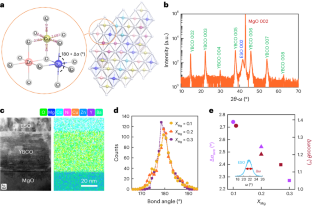2024-05-20 ミシガン大学
<関連情報>
- https://news.umich.edu/ai-chips-could-get-a-sense-of-time/
- https://www.nature.com/articles/s41928-024-01169-1
調整可能なエントロピー安定化酸化物メモリスターを用いた効率的なデータ処理 Efficient data processing using tunable entropy-stabilized oxide memristors
Sangmin Yoo,Sieun Chae,Tony Chiang,Matthew Webb,Tao Ma,Hanjong Paik,Yongmo Park,Logan Williams,Kazuki Nomoto,Huili G. Xing,Susan Trolier-McKinstry,Emmanouil Kioupakis,John T. Heron & Wei D. Lu
Nature Electronics Published:20 May 2024
DOI:https://doi.org/10.1038/s41928-024-01169-1

Abstract
Memristive devices are of potential use in a range of computing applications. However, many of these devices are based on amorphous materials, where systematic control of the switching dynamics is challenging. Here we report tunable and stable memristors based on an entropy-stabilized oxide. We use single-crystalline (Mg,Co,Ni,Cu,Zn)O films grown on an epitaxial bottom electrode. By adjusting the magnesium composition (XMg = 0.11–0.27) of the entropy-stabilized oxide films, a range of internal time constants (159–278 ns) for the switching process can be obtained. We use the memristors to create a reservoir computing network that classifies time-series input data and show that the reservoir computing system, which has tunable reservoirs, offers better classification accuracy and energy efficiency than previous reservoir system implementations.



